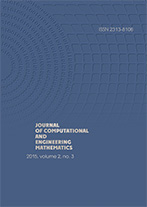|
Computational Mathematics
Precision statistics: fractional number of degrees of freedom chi-square criterion for small samples of biometric data
V. I. Volchikhina, A. I. Ivanovb, E. A. Malyginaa, E. N. Kupriyanova, Yu. I. Serikovaa
a Penza State University, Penza, Russian Federation
b Penza Scientific Research Electrotechnical Institute, Penza, Russian Federation
Abstract:
The article presents the results of numerical modeling of the distribution of chi-square criterion for small samples with a volume of 8 to 80 examples for normal distribution of values. It is shown that, for small samples, the recommendations of Gosstandart R 50.1.037-2002 give too optimistic estimates of confidence probability when testing the hypothesis of normality of the empirical law. Errors in the estimation of confidence probability can be eliminated if we turn to the use of fractional indices of number of degrees of freedom. The connection curves of a fractional number of degrees of freedom of a chi-square distribution with sample size are given. The decrease in estimation errors with increasing sample size of experimental data is shown. So with 21 experiences, it is necessary to increase by 62% the typical value of the number of degrees of freedom. With a sample size of 81 experience, increasing the number of degrees of freedom falls by 31%. The need to adjust the number of degrees of freedom is completely eliminated only with samples of more than 2000 experiments. The logarithmic approximation of the fractional number of degrees of freedom for 7 and 9 equal intervals of the histogram is given.
Keywords:
chi-square criterion, small samples, fractional value of the number of degrees of freedom.
Received: 24.01.2019
Citation:
V. I. Volchikhin, A. I. Ivanov, E. A. Malygina, E. N. Kupriyanov, Yu. I. Serikova, “Precision statistics: fractional number of degrees of freedom chi-square criterion for small samples of biometric data”, J. Comp. Eng. Math., 6:1 (2019), 55–62
Linking options:
https://www.mathnet.ru/eng/jcem139 https://www.mathnet.ru/eng/jcem/v6/i1/p55
|

| Statistics & downloads: |
| Abstract page: | 136 | | Full-text PDF : | 73 | | References: | 22 |
|




 Contact us:
Contact us: Terms of Use
Terms of Use
 Registration to the website
Registration to the website Logotypes
Logotypes








 Citation in format
Citation in format 